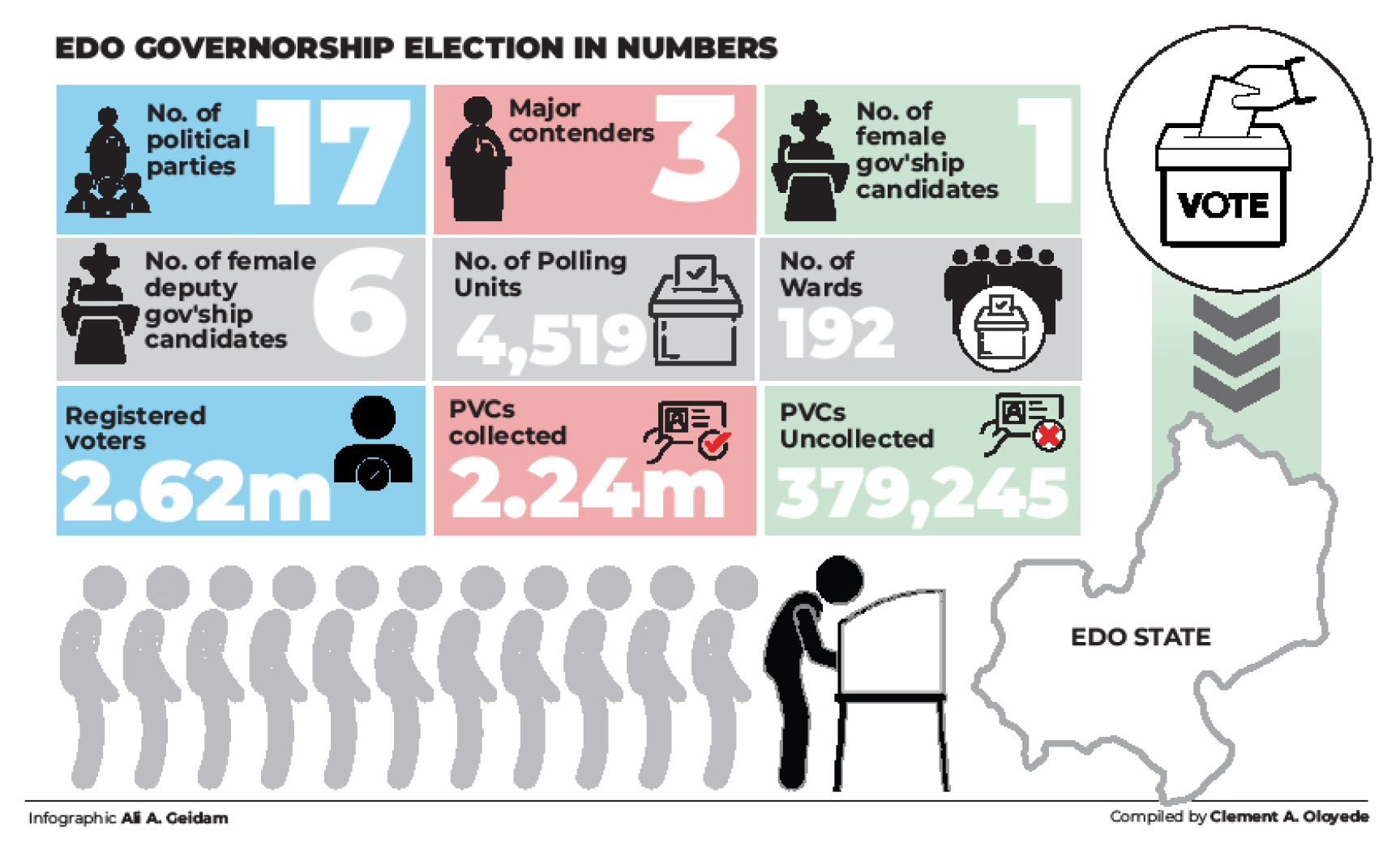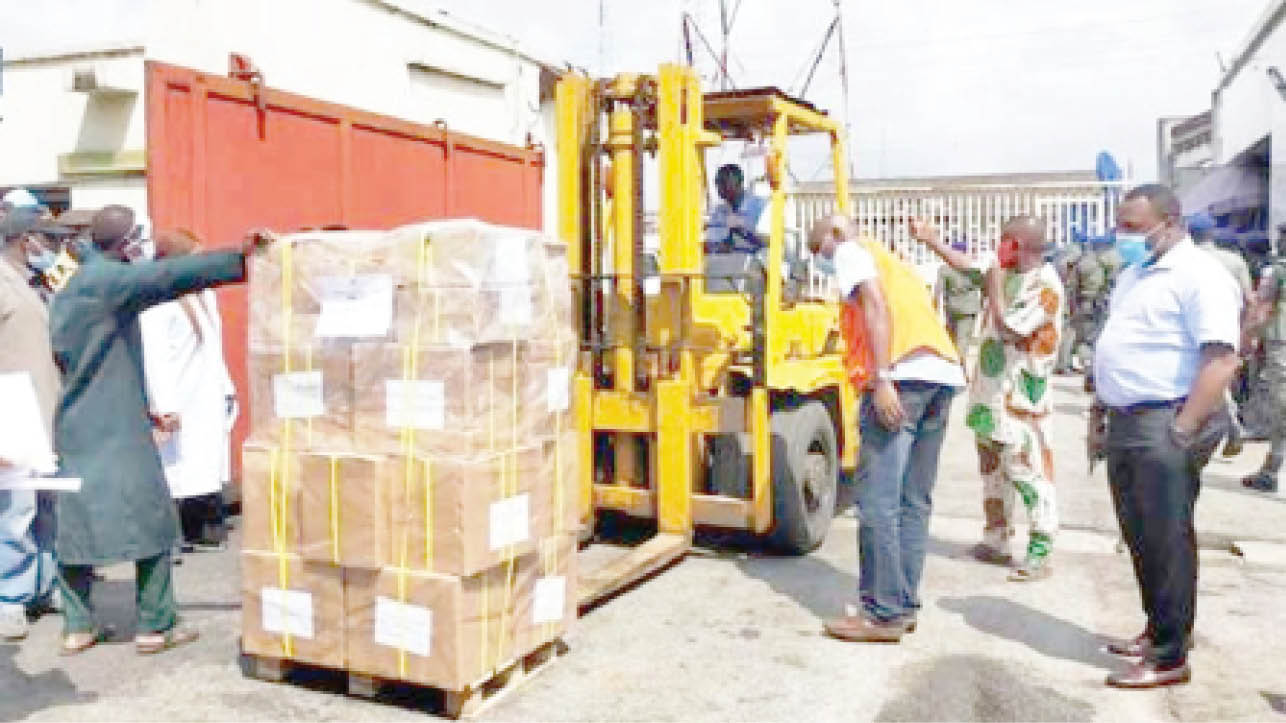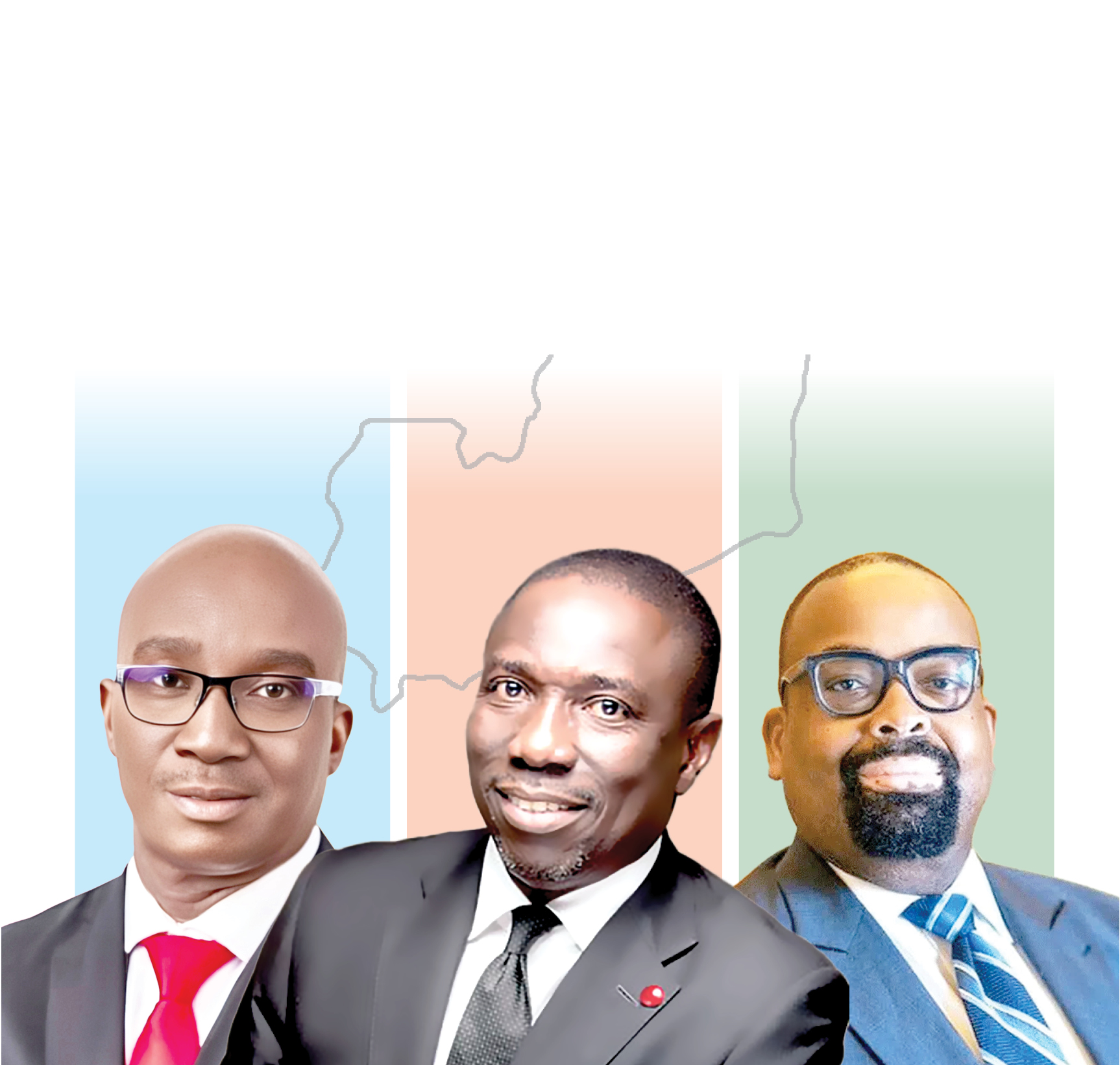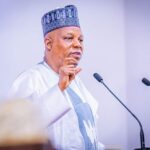At least 2,249,780 voters who have collected their Permanent Voters Cards (PVCs) in Edo will today elect the next governor of the state, referred to as the “Heartbeat of the Nation.”
This number, according to the Independent National Electoral Commission (INEC), represents 85.57 per cent of the 2,629,025 total registered voters in the state with 379,245 uncollected PVCs. Comparatively, in the last governorship election in the state, of the 2,210,534 registered voters in 2020, only 557,443 turned up for accreditation on election day, out of which 550,242 voted.
With the atmosphere in the state charged with the rhetoric of violence and pockets of violence in the buildup to the election, the police said they had deployed 35,000 personnel, while the Nigeria Security and Civil Defence Corps (NSCDC) announced the deployment of 6,433 personnel, even as the military announced that it had received a presidential mandate to ensure a free and fair poll. The police had announced a similar figure for the 2020 governorship election in the state.
The police and other security agencies also promised neutrality and decisive actions against any act capable of jeopardising the credibility of the process. But despite these, the atmosphere has remained tensed.
- Campus insecurity: 28 students killed, 78 kidnapped in 20 months
- Bello, Abdulsalami, Danjuma, Tinubu, Okonjo-Iweala in the news
On Thursday, the electoral umpire also commenced the distribution of sensitive materials for the election, which included 5,000 Bimodal Voter Accreditation Systems (BVAS). This, it said, would ensure a smooth election across the 4,519 polling units and 211 collation centres, which include 192 wards, 18 local government collation centres, and the state collation centre in Benin City, the state capital. It also said 18,076 ad-hoc staff would be deployed.
Respect voters’ will, Tinubu tells politicians
Meanwhile, President Bola Ahmed Tinubu has appealed to those participating in the election to ensure that the exercise is peaceful.
In a statement released on Friday by his Special Adviser on Information and Strategy, Bayo Onanuga, Tinubu emphasised the importance of honouring the democratic process, urging the candidates, political parties and their supporters to allow voters to freely choose their leaders, stating that he believes in the electorate’s ability to make informed decisions.
Tinubu also called on the INEC and security agencies to maintain impartiality, stressing the need for a peaceful and fair election.
The election is considered pivotal to the political configuration and future of the state’s developmental strides due to the various interests at play and the position of the state as a professional hub.
With a vibrant political landscape that reflects the diversity of opinions among its citizens, Edo is divided along ethnic lines, cutting across the three senatorial zones—South, North and Central – and 18 local government areas.
But the intrigues in the current cycle have seen more intense zonal permutations than previous elections.
Although 17 political parties fielded candidates, the poll is expected to be a contest of strength among the three major parties – the ruling Peoples Democratic Party (PDP) in the state, All Progressives Congress (APC) and Labour Party (LP).
In an apparent bid to address the perceived marginalisation of the Edo Central senatorial district, which has not produced a governor since the return to democracy in 1999, both the PDP and APC ensured that their candidates, Asue Ighodalo and Senator Monday Okpebholo were picked from the zone. The LP candidate, Olumide Akpata, however, is from Edo South, same as the outgoing governor, Godwin Obaseki.

The chairmen of the parties that spoke with our correspondent about their expectations of the election were all optimistic.
The state chairman of the PDP, Tony Azeigbemi, believes that Governor Obaseki’s performance over the past eight years would be the key to the party’s success.
“We have campaigned vigorously across all 192 wards and 1,519 polling units. We are confident that INEC will uphold electoral laws and allow Edo to decide its future,” he said.
His counterpart in the APC, Emperor Jarret Tenabe, however, dismissed PDP’s chances, declaring the race a contest between the APC and Labour Party.
“The PDP is out of the race. It is between us and the Labour Party, but Labour is inconsequential because many of their supporters have already joined us,” he said.
The LP chairman, Kelly Ogbaloi, on his part, disagrees with the notion that the party is a third force, saying, “We are the first force now because those previously seen as the first force are no longer relevant.” He added that the party would do everything possible to ensure that the votes count, saying “We can’t have a repeat of what happened in the 2023 election against us.”
Observers, however, said all the parties had their strong and weak points.
As the parties remain upbeat about their chances, the focus is on how prepared the electoral body and the security agencies are. The Chief Administrative Officer of the Independent National Electoral Commission (INEC), Zainab Aminu Abubakar, told Weekend Trust that the commission was doing everything possible to ensure a credible and acceptable election.
She said: “INEC has been doing its utmost to ensure transparent elections. We introduced the upload of polling unit results to the iREV portal. As soon as the election results are finalised at the polling units, officials will upload the result sheet to the internet. Anyone can visit our website and view the results.”
Issues that may shape election’s outcome
The Edo governorship election is widely perceived as a contest between two political godfathers – Governor Godwin Obaseki and Senator Adams Oshiomhole – with a third force, Labour Party candidate, Olumide Akpata, poised to take advantage of any misstep by the PDP and APC.
Other candidates include Uwaifo Osaro of the Action Alliance (AA), Aner Aliu of the Social Democratic Party (SDP, and Azena Azemhe Friday of the New Nigeria Peoples Party (NNPP), with Key Ndidi of the Peoples Redemption Party (PRP) being the only female candidate.
Governor Obaseki is seeking to establish himself as a political kingmaker by backing Asue Ighodalo on the PDP ticket, while his former ally and political godfather, Senator Oshiomhole, hopes to reaffirm his dominance in Edo politics by ensuring that Senator Monday Okpebholo wins on the platform of the APC. Oshiomhole, a two-term governor and current senator for Edo North, played a significant role in Obaseki’s rise to power, but their relationship soured towards the end of the incumbent governor’s first term, leading to high-stakes political rivalry.
The chairman of the Naija Times Journalism Foundation, Ehi Braimah, said that while Obaseki and Oshiomhole are not on the ballot, their influence is overshadowing the election.
“The political scene is driven by a clash of egos between these key figures,” Braimah observed, adding that the rhetoric from both camps has been divisive and concerning.
An election observer and member of the West Africa Democracy Solidarity, Austin Aigbe, echoed similar sentiments, noting that the election is essentially a power struggle between Obaseki and Oshiomhole.
Parties’ internal crises
The internal crises within the major political parties in the state have also significantly influenced the dynamics of the governorship election, weakening the parties’ cohesion and casting doubt on their chances of winning.
The ruling PDP has been embroiled in a deep and prolonged crisis, primarily stemming from the emergence of Asue Ighodalo as the party’s governorship candidate. His emergence triggered a public spat between Governor Obaseki and his deputy, Philip Shaibu, who had harboured ambition of succeeding the governor.
Other aspirants within the PDP who felt sidelined during the primary election either left the party or remained, albeit without actively working for its success.
The party has been further divided into two factions: the “New PDP” led by Obaseki and the “Old PDP” faction headed by the suspended national vice chairman, South-South, Chief Dan Orbih. This factionalisation, which began after PDP’s victory in the 2020 governorship election, worsened as the 2024 election approached, leading to numerous resignations and defections, particularly in the Edo South and Edo Central senatorial districts.
The APC has also not been without its share of fallout from the primary election that saw Senator Okpebholo emerge as its candidate, leading to several resignations.
Also, the Labour Party (LP), regarded as the third force in this election, has not been immune to internal turmoil either. Since its relative success in the 2023 general elections, the party has been engulfed in a national leadership crisis, which has trickled down to its Edo chapter. The state chapter has faced a leadership dispute between the loyalists of embattled national chairman, Julius Abure and the state chairman, Kelly Ogbaloi. Abure, who hails from Edo State, appointed former Speaker Elizabeth Ativie as caretaker chairman, effectively sidelining Ogbaloi’s leadership. Despite this, the majority of the party’s members, including its governorship candidate, Olumide Akpata, have thrown their support behind the Ogbaloi-led state executive.
This crisis delayed the party’s governorship campaign, which only began two weeks before the election.

Threats of violence and voter apathy
Beyond the power play of the two kingmakers and the crises within the parties, another critical issue likely to shape the outcome of the poll is security, with violence and threats of violence escalating.
The PDP and APC have been locked in a war of words, each accusing the other of inciting violence to gain an edge in the election. This rhetoric has significantly raised anxiety among the electorate.
According to a report by Kimpact Development Initiative (KDI), the concerns may not be unfounded. Between January 1 and September 14, 95 incidents of violence, both electoral and non-electoral, were recorded in the state.
Speaking during a town hall meeting on election security, the executive director of KDI, Bukola Idowu, noted that the report documented 35 instances of electoral violence, with the rest relating to societal issues, such as kidnapping and land disputes.
“This is a worrying trend. Tensions have escalated as the election nears,” he said.
Vote buying
Concerns about vote buying and selling also became more prominent ahead of the election.
Observers fear that political parties and their candidates may exploit the country’s unfavourable economic situation to persuade voters to sell their votes.
Confirming that the leading parties have already begun to induce voters, Yiaga Africa, last week accused politicians of distributing cash and food items to sway the electorate during the pre-election campaign.
The organisation’s director of programmes, Cynthia Mbamalu, stated that findings revealed, “These incidents were primarily observed or reported in Uselu market, Egor Local Government Area, where market women received cash gifts, ranging from N1,000 to N2,000 from the APC and PDP during their campaign tours. Similarly, PDP campaigners distributed wrappers to women who attended a campaign gathering in Esan North East Local Government Area.”
“In the Ubiaja community of Esan South East Local Goverrnment Area, PDP campaigners also gave several shop owners shirts, caps, umbrellas and up to N2,000,” she added.
Contributions from Usman A. Bello & Daniel Oluwole

 Join Daily Trust WhatsApp Community For Quick Access To News and Happenings Around You.
Join Daily Trust WhatsApp Community For Quick Access To News and Happenings Around You.

